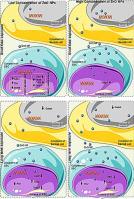The International Journal of Biochemistry & Cell Biology ( IF 3.4 ) Pub Date : 2020-08-06 , DOI: 10.1016/j.biocel.2020.105822 Azam Javadi 1 , Saadat Mokhtari 2 , Seyedeh-Faezeh Moraveji 3 , Forough-Azam Sayahpour 3 , Maryam Farzaneh 4 , Hamid Gourabi 5 , Fereshteh Esfandiari 3

|
Extensive application of zinc oxide (ZnO) nanoparticles (NPs) in everyday life results in increased exposure to these NPs. Spermatogonial stem cells (SSCs) guarantee sperm production throughout the male reproductive life by providing a balance between self-renewal and differentiation. We used an in vitro platform to investigate the ZnO NPs effects on SSCs. We successfully synthesized ZnO NPs. In order to investigate these NPs, we isolated SSCs from mouse testes and cultured them in vitro. Our results confirmed the uptake of ZnO NPs by the cultured SSCs. We observed a dose- and time-dependent decrease in SSC viability. Both spherical and nanosheet ZnO NPs had the same cytotoxic effects on the SSCs, irrespective of their shapes. Moreover, we have shown that short time (one day) exposure of SSCs to a low concentration of ZnO NPs (10 μg/mL) promoted expressions of specific genes (Plzf, Gfr α1 and Bcl6b) for SSC self-renewal and differentiation genes (Vasa, Dazl, C-kit and Sycp3) expressed by spermatogonia during spermatogenesis. Our study provides the first insight into ZnO NPs function in SSCs and suggests a new function for ZnO NPs in the male reproductive system. We demonstrated that ZnO NPs might promote spermatogenesis via upregulation of gene expression related to SSC self-renewal and differentiation at low concentrations. Additional research should clarify the possible effect of ZnO NPs on the SSC genome and its effects on human SSCs.
中文翻译:

短时间暴露于低浓度的氧化锌纳米颗粒会上调自我更新和与精子生成相关的基因表达。
日常生活中广泛使用氧化锌(ZnO)纳米颗粒(NPs)会增加对这些NPs的暴露。精原干细胞(SSC)通过在自我更新和分化之间取得平衡,保证了整个男性生殖生活中的精子产生。我们使用了一个体外平台来研究ZnO NPs对SSC的影响。我们成功地合成了ZnO NP。为了研究这些NP,我们从小鼠睾丸中分离了SSC,并进行了体外培养。我们的结果证实了培养的SSC对ZnO NP的吸收。我们观察到SSC活力的剂量和时间依赖性降低。球形和纳米片状ZnO NP对SSC均具有相同的细胞毒性作用,无论其形状如何。此外,我们已经表明,短时间内(一天)SSC暴露于低浓度的ZnO NPs(10μg/ mL)会促进SSC自我更新和分化基因的特定基因(Plzf,Gfrα1和Bcl6b)的表达(Vasa,Dazl,C-kit和Sycp3)在生精过程中由精原细胞表达。我们的研究为SSC中ZnO NPs的功能提供了第一个见解,并提出了男性生殖系统中ZnO NPs的新功能。我们证明了ZnO NPs在低浓度下可能通过上调与SSC自我更新和分化相关的基因表达来促进精子发生。进一步的研究应阐明ZnO NP对SSC基因组的可能影响及其对人类SSC的影响。









































 京公网安备 11010802027423号
京公网安备 11010802027423号